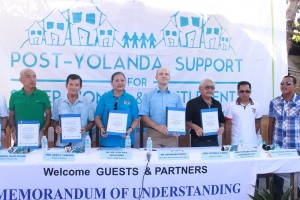 BAYBAY, Roxas City, Capiz-The Department of Social Welfare and Development (DSWD) today (November 22, 2014) inked a Memorandum of Understanding (MoU) with the United Nations – Habitat and Local Government Units of Capiz and Iloilo for the construction of housing units for survivors of typhoon Haiyan locally known as Yolanda.
BAYBAY, Roxas City, Capiz-The Department of Social Welfare and Development (DSWD) today (November 22, 2014) inked a Memorandum of Understanding (MoU) with the United Nations – Habitat and Local Government Units of Capiz and Iloilo for the construction of housing units for survivors of typhoon Haiyan locally known as Yolanda.
The project, known as Post Yolanda Support for Safer Homes and Settlements and wherein DSWD is investing a total of P42.7 million, has a target of completing 610 houses in the municipalities of Roxas, Panay and Pontevedra in Capiz Province and Estancia, Iloilo. Allocation per household is pegged at P70,000 from the government. UN-Habitat, on the other hand, is providing additional funds to complete the construction of the housing units.
The MoU signing was conducted at Barangay Baybay Homeowners Association, Inc. (HOAI) here with DSWD regional director Ma. Evelyn B. Macapobre; Human Settlement Officer Bernhard Barth of UN Habitat Regional Officer for Asia and the Pacific in Fukuoka, Japan; mayors Angel Alan Celino of Roxas City, Dante Bermejo of Panay, Esteban Jose Conteras of Pontevedra, all in Capiz; Estancia, Iloilo mayor Rene Cordero; and witnessed by Capiz governor Victor Tanco.
“We are the social welfare arm of the Philippine government and we have many programs including augmentation to Local Social Welfare and Development Officers along services on disaster response and rehabilitation. We all know that Western Visayas was affected. The municipalities of Panay, Pontevedra Roxas City here in Capiz and Estancia in Iloilo are just four of the 84 badly hit areas in the region. The officials of these LGUs have been finding projects for their recovery. But this is not possible with them alone. Kaya kaming tatlo—UN Habitat, the four LGUs and DSWD– have come to an understanding that we are going to work together to help 610 families for this project,” said Macapobre.
“Since the DSWD funding is not enough, UN Habitat will provide the additional amount to completely build the houses,” she added.
LGUs and homeowners association, on the other hand, will monitor the actual construction of the houses including the materials being used.
“We are positive that we will be able to complete the houses by March at the latest. Now, we see a good number completed in Baybay. We would like to thank UN Habitat to make the partnership a reality. To our LGU partners let us do this fast so that we will be able to bring families in their own homes by Christmas,” Macapobre said.
BUILD BACK BETTER
For his part, Barth of the UN Habitat said, “Building back better is critical. This partnership with the national government is important not only because of the sharing of resources but also in finding ways on how to rebuild houses in a cheaper, faster way and culturally accepted through the involvement of communities.”
Barth also said that the project can also be an instrument to improve “the way we do shelter response in a way that we build back better to avoid disasters in the future.”
PEOPLE’S PROCESS
One thing which makes the project more responsive is its People’s Process method. It places people at the center of the project, not only to provide safer homes, but to empower them to become disaster resilient.
The project uses a community driven approach to recovery and rehabilitation. Consultations with community groups helped UN Habitat design and refine a sturdy house meant to meet basic needs of the beneficiary households. The design was developed in collaboration with the Capiz chapter of the United Architects of the Philippines, and its structural integrity has been checked by the Capiz chapter of the Association of Structural Engineers of the Philippines.
REPAYING THE KINDNESS
Governor Tanco, for his part, thanked UN Habitat, LGUs and the national government. He also urged the homeowners, called as “program partners,” to take good care of the houses.
“We could never repay them. What you could is for you to take care of your houses, maintain them and keep them in good condition. It is not everyday that you get a house,” said Tanco.
The project is supported by the government of Japan with a $2.5 million fund. It is also implemented in partnership with the Housing and Urban Development Coordinating Council, Government of Japan, Social Housing Finance Corporation. /dswd6/May Rago-Castillo (with report from UN Habitat Philippines and UN Habitat Roxas City Office)
